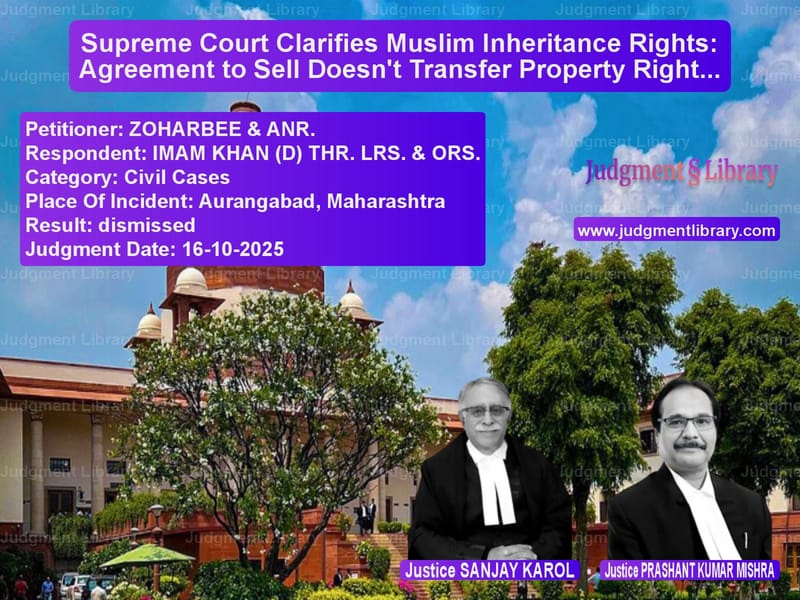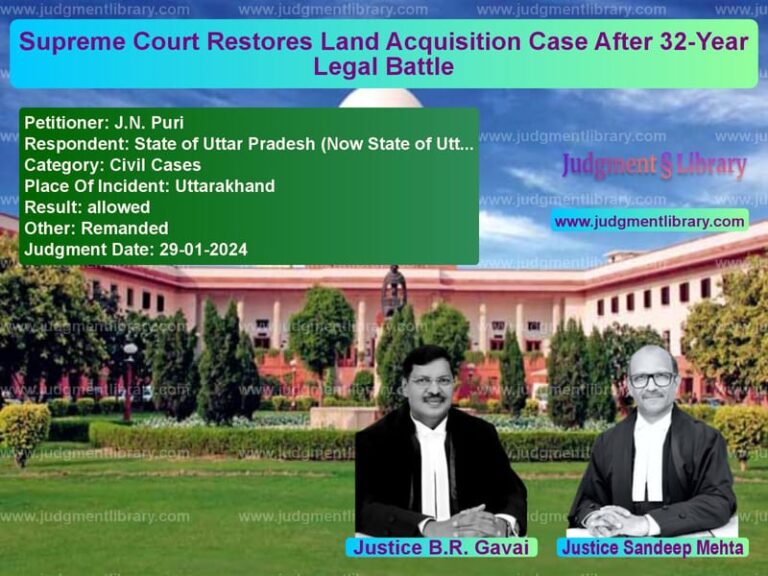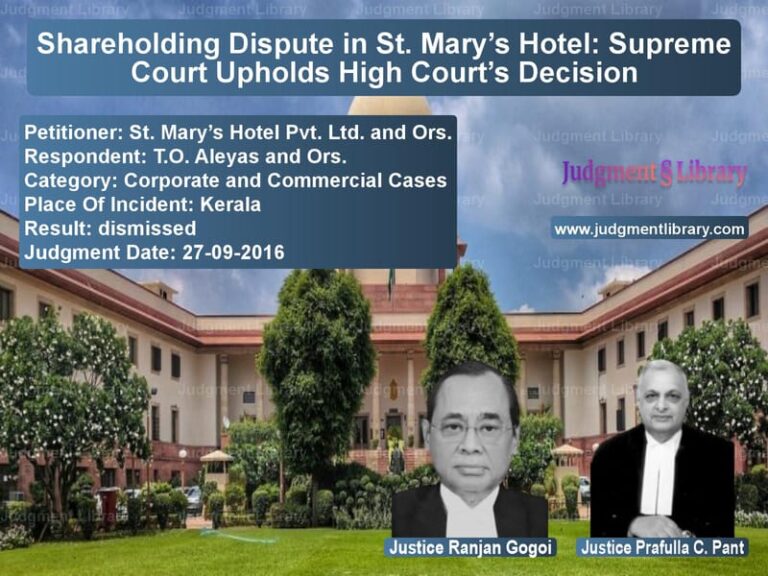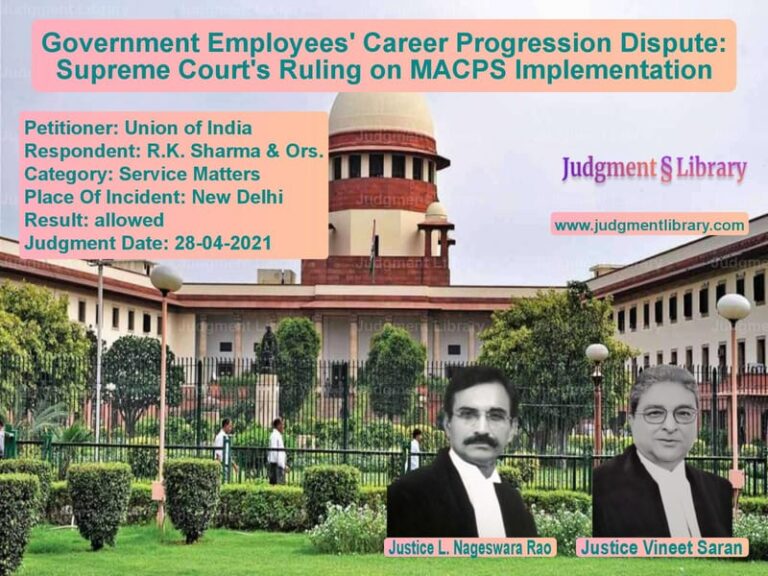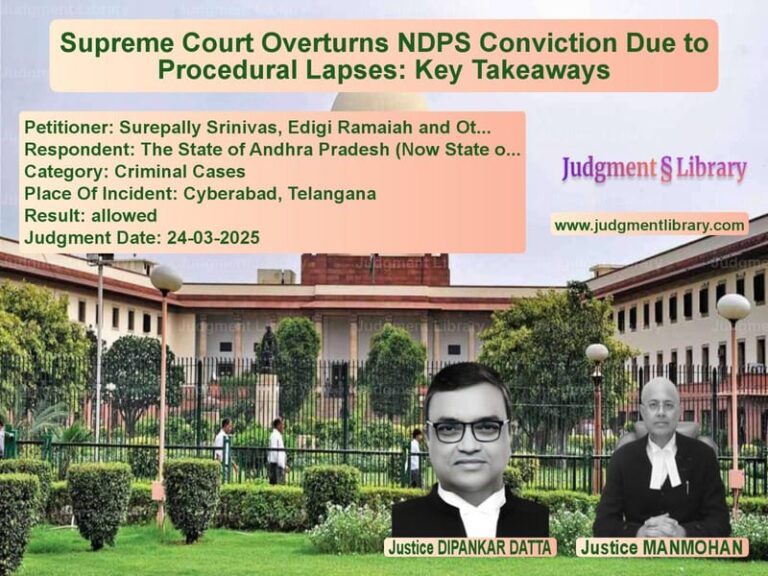Supreme Court Clarifies Muslim Inheritance Rights: Agreement to Sell Doesn’t Transfer Property Rights
In a significant judgment that clarifies crucial aspects of Muslim inheritance law and property rights, the Supreme Court of India has delivered a verdict that will have far-reaching implications for property disputes within the Muslim community. The case involved a complex family dispute between Zoharbee, the widow of Chand Khan, and his brother Imam Khan over properties left behind by the deceased. The legal battle, which spanned multiple courts over several years, centered around fundamental questions about what constitutes ‘matruka’ property and how agreements to sell affect inheritance rights under Mohammedan law.
The dispute originated from two plots of land – Survey No.22/3 and 22/1 of Gut No. 107 and Gut No.126 – that belonged to Chand Khan before his death. The case presented a classic conflict between contractual agreements and inheritance rights, testing the boundaries of how property is treated when someone dies without completing transactions they initiated during their lifetime. Zoharbee, as the surviving spouse, claimed that all property left by her husband constituted ‘matruka’ property and since he died without children, she was entitled to three-fourths of the total property under Mohammedan law, with the remaining one-fourth going to his brother Imam Khan.
On the other side, Imam Khan argued that one piece of land had already been transferred to third parties during Chand Khan’s lifetime through an Agreement to Sell dated November 1999, while the other plot had been transferred to his exclusive ownership years before Chand Khan’s death. He contended that nothing remained to be partitioned as ‘matruka’ property since the properties were no longer part of Chand Khan’s estate at the time of his death.
The Civil Court initially sided with Imam Khan, partly decreeing the suit in favor of Zoharbee only for the property sold to the fourth defendant, while holding that the Agreement to Sell for the other property excluded it from the inheritance pool. However, this decision was reversed by the First Appellate Court, which held that the entire suit was maintainable and Zoharbee was entitled to three-fourths of the total property. The High Court subsequently dismissed the second appeal, leading to the matter reaching the Supreme Court.
The Core Legal Questions
The Supreme Court, comprising Justices Sanjay Karol and Prashant Kumar Mishra, identified two fundamental issues that needed resolution. The first was whether an agreement to sell would be sufficient to exclude property from the scope of ‘matruka’ property to be partitioned at the time of death. The second question was whether the properties of deceased Chand Khan qualified as ‘matruka’ properties within the meaning of Mohammedan law.
In addressing these questions, the Court delivered a comprehensive analysis of property law principles, particularly focusing on the legal status of agreements to sell. The judgment extensively referenced previous Supreme Court rulings, especially the landmark case of Suraj Lamp & Industries (P) Ltd. (2) v. State of Haryana, which had clearly established that “a contract of sale, that is, an agreement of sale does not, of itself, create any interest in or charge on such property.”
The Court emphasized that “an agreement to sell does not confer any rights nor does it vest any interest into the party that agrees thereby to buy a particular property. This is a well acknowledged position in law.” Quoting from established precedent, the judgment noted that “Section 54 of the TP Act makes it clear that a contract of sale, that is, an agreement of sale does not, of itself, create any interest in or charge on such property” and that “only on execution of conveyance, ownership passes from one party to another.”
Understanding ‘Matruka’ Property
The Court provided a detailed explanation of the concept of ‘matruka’ property in Muslim law, referencing both judicial precedents and authoritative texts. Quoting from Jamil Ahmad v. Vth ADJ, Moradabad, the judgment stated that “the property (both movable as well as immovable) left by a deceased Muslim is called matruka.” The Court further referenced dictionary definitions, noting that according to John T Platts’ A Dictionary of Urdu, Classical Hindi and English, ‘matruka’ means “the estate of a deceased person,” while the Rekhta Dictionary defines it as “abandoned from his possession (property etc.)[,] left by immigrants (property etc.) [,] inherited wealth and property etc.”
The Court clarified that “matruka property simply refers to property left behind by deceased person and nothing more.” This straightforward definition became crucial in determining that the properties in question indeed formed part of Chand Khan’s estate at the time of his death, despite the existence of agreements to sell.
Principles of Muslim Inheritance
The judgment provided an extensive overview of the principles governing inheritance under Mohammedan law, drawing from both religious texts and authoritative legal commentaries. The Court referenced the Holy Quran, specifically Chapter IV, Verse 12, which delineates how division of property should take place. The verse states: “And for you is half of what your wives leave if they have no child. But if they have a child, for you is one fourth of what they leave… And for the wives is one fourth if you leave no child. But if you leave a child, then for them is an eighth of what you leave…”
The Court also extensively quoted from Mulla’s Principles of Mahomedan Law, explaining the three classes of heirs: “(1) Sharers, (2) Residuaries, and (3) Distant Kindred.” The judgment elaborated that “Sharers are those who are entitled to a prescribed share of the inheritance” while “Residuaries are those who take no prescribed share, but succeed to the ‘residue’ after the claims of the sharers are satisfied” and “Distant Kindred are all those relations by blood who are neither Sharers nor Residuaries.”
Applying these principles to the case at hand, the Court noted that “the sharers are entitled to a prescribed share of the inheritance and wife being a sharer is entitled to 1/8th the share but where there is no child or child of a son how low so ever, the share to which the wife is entitled is 1/4th.” This clarification was essential in determining the exact shares to which Zoharbee and Imam Khan were entitled.
The Court’s Reasoning and Final Decision
The Supreme Court firmly rejected the argument that the Agreement to Sell removed the property from Chand Khan’s estate. The Court held that “since the Agreement to Sell has no value in the eyes of law, all the property that vested in Chand Khan would become matruka property.” The judgment emphasized that “the property agreed to be sold was, at the relevant time still the property of Chand Khan and therefore would be subject to division of property as per the applicable law.”
The Court was particularly critical of the Civil Court’s approach, stating that “the Civil Court, therefore, clearly fell in error taking into consideration an incomplete sale wherein the sale deed had not been executed and excluding the said property from the total that had to be divided.” The judges further observed that “the defendant no.1, in executing the sale deed had the right only to do so in respect of the 1/4th share that fell in her share and not the entire property for the maxim governing such transactions is nemo dat quod non habet which translates to no one can transfer a better title onto another than what they themselves have.”
This last point about the legal maxim ‘nemo dat quod non habet’ (no one can give what they don’t have) was particularly significant, as it prevented Zoharbee from transferring more property than she actually owned through inheritance.
Broader Implications and Additional Observations
The Supreme Court’s judgment has several important implications for property disputes within the Muslim community. First, it firmly establishes that mere agreements to sell do not transfer ownership rights, and property subject to such agreements still forms part of the deceased’s estate for inheritance purposes. Second, it provides clear guidance on the calculation of shares under Mohammedan law, particularly in cases where the deceased dies without children.
The Court also made an important observation about the quality of translations in legal proceedings, expressing “dissatisfaction with the manner in which the judgment of the learned Civil Court was translated into English.” The judges emphasized that “in matters of law, words are of indispensable importance. Each word, every comma has an impact on the overall understanding of the matter. Due care has to be taken to ensure that the true meaning and spirit of the words in the original language are translated into English for the Courts in appeal to comprehend what had transpired below.”
Conclusion
The Supreme Court’s dismissal of the appeals brings clarity to an important area of property and inheritance law. By reaffirming that agreements to sell do not transfer ownership and that property subject to such agreements remains part of the deceased’s estate, the judgment protects the inheritance rights of legal heirs. The detailed explanation of ‘matruka’ property and the principles of Muslim inheritance provides valuable guidance for future cases involving similar issues.
This judgment serves as an important reminder that while contractual agreements are important in property transactions, they must comply with established legal formalities to effectively transfer ownership. The ruling ensures that inheritance rights under personal laws are not easily defeated by incomplete transactions, thereby protecting the interests of vulnerable heirs, particularly widows who might otherwise be deprived of their legitimate share in ancestral property.
The case also highlights the continuing relevance of personal laws in India’s legal landscape and the judiciary’s role in interpreting and applying these laws in a manner that balances contractual freedom with the protection of inheritance rights. As property values continue to rise across India, such clarifications become increasingly important in preventing family disputes and ensuring that inheritance is distributed according to established legal principles rather than through technical loopholes or incomplete transactions.
Petitioner Name: ZOHARBEE & ANR..Respondent Name: IMAM KHAN (D) THR. LRS. & ORS..Judgment By: Justice SANJAY KAROL, Justice PRASHANT KUMAR MISHRA.Place Of Incident: Aurangabad, Maharashtra.Judgment Date: 16-10-2025.Result: dismissed.
Don’t miss out on the full details! Download the complete judgment in PDF format below and gain valuable insights instantly!
Download Judgment: zoharbee-&-anr.-vs-imam-khan-(d)-thr.-l-supreme-court-of-india-judgment-dated-16-10-2025.pdf
Directly Download Judgment: Directly download this Judgment
See all petitions in Property Disputes
See all petitions in Succession and Wills
See all petitions in Contract Disputes
See all petitions in Specific Performance
See all petitions in Muslim Personal Law
See all petitions in Judgment by Sanjay Karol
See all petitions in Judgment by Prashant Kumar Mishra
See all petitions in dismissed
See all petitions in supreme court of India judgments October 2025
See all petitions in 2025 judgments
See all posts in Civil Cases Category
See all allowed petitions in Civil Cases Category
See all Dismissed petitions in Civil Cases Category
See all partially allowed petitions in Civil Cases Category

